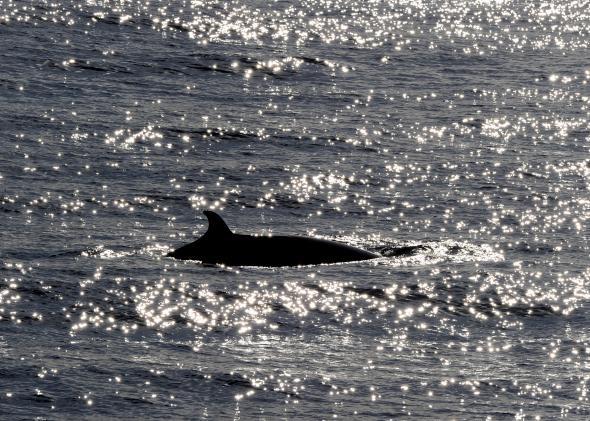The International Court of Justice ruled today that Japan’s annual whale hunt is not actually carried out for scientific purposes, as the Japanese government has halfheartedly claimed, and therefore violates rules set up by the International Whaling Commission. The “science” justification was always a bit of a stretch, given the existence of things like websites selling whale jerky, so it’s not surprising that Tokyo is venting most of its anger not toward the court but toward the commission that set up the rules in the first place:
[Japan’s Chief Cabinet Secretary Yoshihide] Suga said Japan has cooperated with the IWC for decades “despite the deep divisions within the Commission, and its inability in recent years to function effectively.” He left the question of what Japan will do next unanswered.
Membership in the International Whaling Commission is voluntary and Norway and Iceland have simply decided to ignore its mandates while remaining members.
Under IWC rules, countries are allowed to issue themselves as many permits as they see fit to kill whales for scientific purposes. The permits are subject to a nonbinding review by a 200-member scientific committee that has been critical of Japan for many of the same reasons outlined by the world court in Monday’s ruling.
While I’m generally in favor of not killing whales, Suga has a point that the IWC is an extremely bizarre organization whose membership makes it a bit difficult to take seriously as an international guarantor of the safety of cetaceans.
The group was founded in 1948 as a regulatory body, and for most of its first quarter-century, its membership consisted of 10 member nations with commercial whaling interests. Then, around the mid-1970s, its membership began to expand rapidly until in 1982, the new members were able to ban commercial whaling entirely.
From then on, membership kept growing, with both the pro- and anti-whaling sides adding to their numbers.
As UCLA political scientist Christian Dippel noted in a recent study of the body, membership in the IWC is open to any country, and today most IWC members have no commercial interests in whaling whatsoever. IWC members include landlocked countries such as Switzerland and Luxembourg on the anti-whaling side, and Malawi and Mongolia on the pro-whaling side.
Not surprisingly, many of these countries often seem less motivated by protecting whales or respecting Japan and Iceland’s cultural heritage then by selling their vote to the highest bidder.
Allegations of vote-buying abounded in 2006, when six small Carribean nations—Antigua and Barbuda, Dominica, Grenada, St. Kitts and Nevis, St. Lucia, and St. Vincent and the Grenadines—that had been “beneficiaries of more than $100 million in Japanese aid over the last eight years,” helped Japan win a vote on the commission declaring the moratorium no longer necessary. The anti-whaling side was bolstered by an influx of landlocked European countries including the Czech Republic, Slovakia, Hungary, Luxembourg, and San Marino.
Dippel’s research found a clear pattern of Japan increasing foreign aid to countries that supported its position on whaling. On the flip side, it turns out whaling doesn’t pay. Because of decreases in aid from Western countries, the net economic impact of becoming a pro-whaling is, on average, negative.
Japan’s bid to buy its way to the legalization of whaling always felt a bit futile. As Erik Voeten wrote in response to Dippel’s research, “there is very little chance that Japan can buy its way into lifting the moratorium. There are too few small developing states in the world to make this feasible. The fact that Japan keeps spending just to get a larger minority and the minor economic significance of commercial whaling suggest that domestic political reasons drive Japan’s behavior.”
It’s also interesting that Japan seems intent on winning international support and gaining some measure of legal legitimacy for its whale hunt, while Norway and Iceland simply reject a moratorium that the IWC has few ways to enforce.
The domestic political factors behind Japan’s quest for whaling legitimacy may not be in place for much longer, however. As the AP reports, fewer people are buying the whale meat that is caught each year in Japan, meaning that “the amount of whale meat stockpiled for lack of buyers has nearly doubled over 10 years” and “more than 2,300 minke whales worth of meat is sitting in freezers while whalers still plan to catch another 1,300 whales per year.”
It will be interesting to see how long Japan continues to fight tooth and nail for its right to hunt an animal that fewer and fewer citizens seem to be interested in purchasing.
